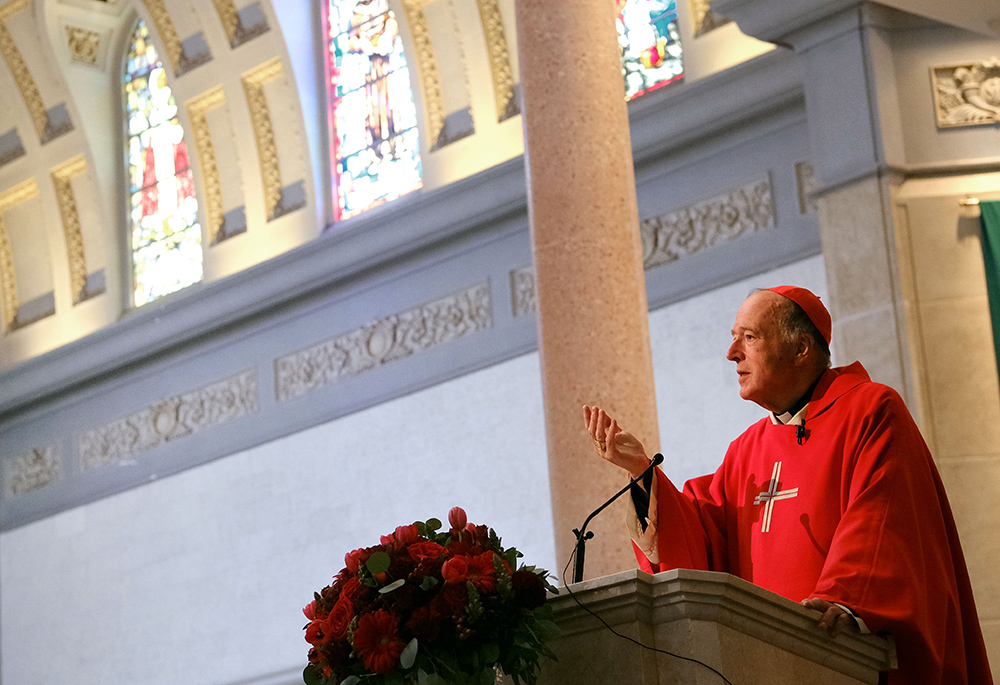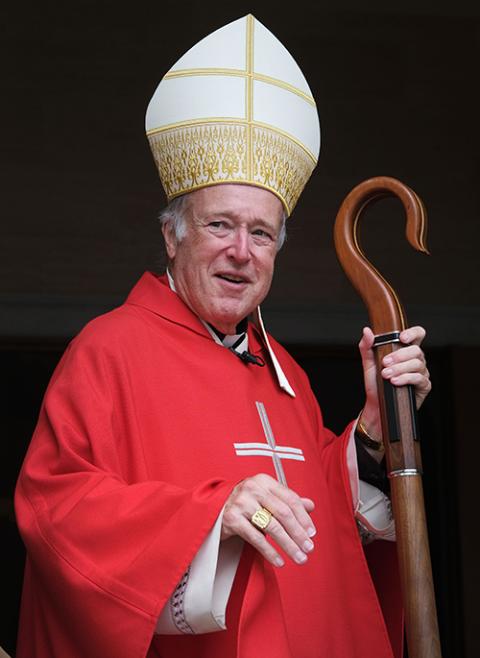
Cardinal Robert McElroy of San Diego celebrates Mass on the campus of the University of San Diego during Mass at The Immaculata Catholic Church Sept. 8, 2022. The liturgy was dedicated to students, faculty and staff of the university, and was his first public Mass in San Diego since being appointed a cardinal. (CNS/David Maung)
Cardinal Robert McElroy is not, as Bishop Thomas Paprocki has suggested, a heretic. Further, as I argued last week (Feb. 24), most of McElroy's episcopal critics are making weak or disingenuous criticisms of his call for a more inclusive approach to sacramental practice.
That doesn't mean McElroy is entirely correct, and today I would like to raise two objections that his critics have not lodged, even while defending his approach on the whole.
First, the sex. I agree with McElroy that "it is the level of objective sinfulness that forms the foundation for the present categorical exclusion of sexually active divorced and remarried or LGBT+ Catholics from the Eucharist" (emphasis mine). It doesn't make sense to automatically consider every sexual sin a mortal sin while other types of sin are not so classified. The critics of McElroy are making an argument similar to conservative Catholics who in 2012 argued that five certain issues were "non-negotiables" because they were categorically different from others. As I asked at the time, just five? In a sense, none of the church's teachings is "negotiable." But, in the conservative reading, all other sins were subject to "prudential judgment," and therefore negotiable. They gave themselves a get-out-of-jail-free card to ignore the church's social teachings, citing their prudential judgment. Something similar is going on here.

Cardinal Robert McElroy of San Diego is seen on the campus of the University of San Diego after Mass at The Immaculata Catholic Church in this Sept. 8, 2022, file photo. (CNS/David Maung)
One of the more sophisticated critiques of McElroy's position came from Fr. Robert Imbelli, but his argument failed on precisely this point of setting sexual sins apart. "As ever for Paul, the 'body' is both the body of individual Christians and the ecclesial body of Christ into whom they are incorporated, initially by baptism and ever more fully in the Eucharist," Imbelli wrote. "But each must seriously examine him or herself, that each may discern the condition of the body: for those 'who eat or drink without discerning the body eat and drink judgment upon themselves' (1 Cor. 11:29). As is evident in Paul, this discernment concerns both sexual and social conduct. For both reveal the self we are becoming or failing to become."
He is right that the Catholic moral life governs bodily persons, but he fails to mention a single type of "social conduct" that would automatically qualify as mortal sin.
McElroy, however, fails to grapple with one way that sexual sins are different. It is not that violating the sixth and ninth commandments is worse than violating the others. It is that sex, money and power are three things that people easily make idols of, and for most of human history, 99% of the human race had no access to money or power. The fixation on sexual sin in Catholicism is due in part to the concerns that arise from having a celibate clergy. Here in America, there is a Calvinistic and Jansenistic equation of sexual purity with holiness. But I would argue that moral theology's focus on sexual sins came from what priests heard in the confessionals, and the people of God knew when they were in danger of making an idol. It is the first commandment, not the sixth, that pricks the conscience.
Advertisement
In the novel Brideshead Revisited, the final, tearful goodbye between Lady Julia Flyte and her lover Charles Ryder captures this aspect of sexual sin. "How can I tell what I shall do? You know the whole of me. You know I'm not one for a life of mourning," Julia tells Charles. "I've always been bad. Probably I shall be bad again, punished again. But the worse I am, the more I need God. I can't shut myself out from His mercy. That is what it would mean; starting a life with you, without Him. One can only hope to see one step ahead. But I saw to-day there was one thing unforgivable – like things in the schoolroom so bad they are unpunishable, that only Mummy could deal with – the bad thing I was on the point of doing, that I'm not quite bad enough to do; to set up a rival good to God's."
Like McElroy, I do not think all sexual sins qualify as mortal sins. But I also think he ignores the very powerful nature of sex to "set up a rival good to God's."
My other objection is ecclesiological. Our brothers and sisters in the Anglican communion managed to finesse the introduction of women clergy, even women bishops, without splitting apart, but LGBT issues threaten to destroy the bonds of unity within that communion. Last month, several bishops in the Global South said they no longer recognized the primacy of Archbishop of Canterbury Justin Welby because of his support for a compromise measure adopted by the Church of England, permitting the blessing of same-sex unions but denying same-sex marriage.
Here in the U.S., the United Methodist Church has been wrecked by disaffiliations of individual churches from the denomination's governing structure due to LGBT issues.
I make no argument from crowd size: It is true that Africa is now the continent with the most Anglicans, and most African Anglican leaders oppose any concession to the LGBT community, but those facts have no bearing on the truth of their claims. Nor does it make sense to grant opponents of more liberal policies and attitudes towards gay men and women a heckler's veto.
That said, the unity of the church is an important consideration in every ecclesial discussion, and I wish McElroy had acknowledged the need for patience and dialogue more fully. As Massimo Faggioli wrote in his book Joe Biden and Catholicism in the United States, "The challenge, both political and ecclesial, in the present emergency is to rebuild a sense of unity that marginalizes the extremes and treats the sectarian instinct as the epitome of non-Catholic spirit."
That said, the unity of the church is an important consideration in every ecclesial discussion, and I wish McElroy had acknowledged the need for patience and dialogue more fully.
Issues of ecclesiology are tied up with issues of history. We are called to be in communion not only with our sisters and brothers around the world today but also with the Catholic Church of the first and fourth and 13th and 17th centuries. When conservatives invoke "the unchanging tradition," they show that they don't know much about the tradition, which has changed in many and varied ways through the centuries. But those who advocate for change must also be able to explain why previous developments of doctrine in a more conservative direction were or are illegitimate. There is a whole different column — and several books — waiting to be written on the interplay of tradition as it was actually lived and tradition as it was handed to us regarding these neuralgic issues.
What most sets McElroy's position apart from the criticisms hurled at him is this: He has raised the issue of inclusion in the context of the synodal process. Many of his critics are the same people who disparage that process. I think McElroy may be wrong on this point or that, but he is contributing to the synodal process.
In his speech at Sacred Heart University, McElroy said, "Reform must nourish the unity of the church, not weaken it." The same must be true of resistance to reform. The episcopal critics of McElroy, who are largely also the critics of Pope Francis, would do well to remember that they, too, are subject to the dictates of the Holy Spirit and called to communion with and under Peter. Labeling a freshly minted cardinal a heretic in public is about as un-Catholic a thing a bishop can do. It is possible to disagree with McElroy respectfully. I just did it.





